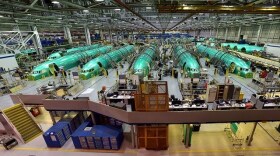Panasonic’s decision to build a $4 billion manufacturing facility in Kansas, that’s expected to create 4,000 jobs, has been big news for the last year or so.
But lost in all that hype is the fact that the state already has nearly 600 foreign companies doing business here, and they employ about 75,000 people.
Businesses like Kyodo Yushi Manufacturing Americas, part of the Maize Industrial Park near West 53rd Street North and 119th Street.
The 54,000-square-foot facility is sort of hidden in plain sight, quietly turning out lubricants for the automotive industry.
Craig Bay is president of the plant, which began operations in 2021 and employs 30 people. He said he still meets people at Wichita business events who don’t know it exists.
Bay said the conversation often sounds like this:
“We're a manufacturer.”
“Well, what do you do?”
“We make grease.”
“You make grease? Here in Wichita?”
“Well, yeah, actually in Maize. …. We’re a joint venture, but predominantly Japanese owned.”
“I didn't know that existed here.”
Right across the street from Bay’s company is Reiloy USA, a German plastics manufacturer.
Other foreign companies are sprinkled throughout south-central Kansas. Aviation firms like Bombardier from Canada and Figeac Aero, a French company.
There’s also Thyssenkrupp Aerospace USA, a German steel company, and beef processor Creekstone Farms in Arkansas City, which is Japanese owned.
Randi Tveitaraas Jack is with the Kansas Department of Commerce’s international division. She spends a lot of time overseas networking with companies.
“A lot of what we're trying to do with international companies is find a connection with Kansas because they're not as familiar with the middle of the country as they are with East and West Coasts,” said Jack, who has worked for the Commerce Department for 35 years. “So whether … they're in an industry sector where Kansas has something unique to offer, like our aviation, renewable energy, we're great for logistics … we excel in food production.
“So a lot of what we do is pitching to a specific industry sector where we have a unique offering to the company.”
Of all the jobs created by foreign investment in Kansas, about a third are in manufacturing.
“They may be a little bit higher-wage job,” Jack said. “They (the companies) may be investing a little bit more in R and D (research and development).
“So, there are some advantages to those companies that are operating in Kansas.”
Another advantage? When those companies decide to grow, Kansas is part of that discussion.
“They're looking globally at where they have operations,” Jack said. “So once they have a footprint in Kansas, that really gives us a leg up on being considered for their future expansion.”
Jack said many of the foreign companies that moved to Kansas – usually with the help of financial incentives from state and local governments – were already doing business here. But they were exporting products to Kansas, not making them here.
“It's a lot better for us if those products are being produced in Kansas by Kansas workers and going to a customer in Kansas or in a surrounding area,” she said. “So, from our perspective, we are actually bringing that wealth into the state, creating more jobs and reducing the amount of importing versus producing for the U.S. market in the U.S. market.”
That was the case with Kyodo Yushi, which was founded in 1936 and has operations across the world. It was hiring companies to produce its products in North America before it entered into a partnership with Wichita-based Lubrication Engineers to set up manufacturing in the area.
Bay said the time difference makes dealing with his bosses in Japan tricky. Depending on daylight saving time, Japan is 13 or 14 hours ahead of Wichita.
“Especially during our startup, we were engaged heavily with our team in Japan, we’ve got to wait 13, 14 hours to have a conversation,” Bay said. “ So, that's either morning for us and evening for the team in Japan, or evening for them and morning for us.”
And learning and understanding how the Japanese conduct business also took some effort, he said.
“We talk it through, we work it through, we don't just shoot from the hip,” Bay said. “Kind of that American culture of, ‘Hey, just shoot from the hip and 80% right's good enough.’
“No. The intent is you talk it through – root cause analysis, countermeasures, corrective actions – and come up with a really well thought out game plan.”
Bay has worked for Kyodo Yushi for six years, beginning in 2017 with the plant’s construction. Before that, he spent 25 years with several Wichita companies and business organizations, including NetApp and the Greater Wichita Partnership.
“I'm a native Wichita, Kansas, boy, born and bred. Love our state. Never planned on working for an international company,” Bay said.
“But what I have found a great joy in … is working with an international Japanese company (that) has given me the opportunity to travel to a part of the world I've never … been to. And to learn to work with some folks from another part of the world that have some very similar passions and desires to do a good job, to make good product and to help build a team.”
Copyright 2023 KMUW | NPR for Wichita. To see more, visit KMUW | NPR for Wichita. 9(MDA4OTAxNzAzMDEzMjc0MTc2MzA5ZDZlMw004))







